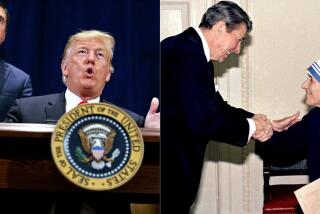Column:: Is Jeb Bush too reasonable for Republicans?

- Share via
For a Republican who once called himself a “head-banging conservative,” Jeb Bush has said some surprisingly nice things about President Obama lately.
He endorsed Obama’s proposed trade deal with Asia. He praised Obama’s tough policies on terrorism, including the National Security Agency’s collection of bulk data. He called on balky Republicans in Congress to confirm Obama’s new attorney general, Loretta Lynch. He even applauded Obama for tightening sanctions on Iran, although he also criticized the president for making concessions in nuclear negotiations.
“I’m not a big Obama fan, but when he does something right, we need to give him credit,” he told an audience in Denver.
Those aren’t Bush’s only departures from conservative orthodoxy. On immigration reform, the former Florida
governor still thinks immigrants who entered the country illegally should eventually get a path to citizenship. He continues to defend the Common Core
education standards, even though right-wingers loathe them as “Obamacore.” And he told voters in New Hampshire that he backs international negotiations to reduce carbon emissions.
All that moderation has pushed hard-line conservatives toward some head-banging of their own.
“Why would Jeb Bush say this?” radio host Rush Limbaugh fumed after Bush spoke in favor of the Lynch nomination. Limbaugh’s answer: “He’s not a conservative.”
“Why don’t we just call it quits, and Jeb and Hillary can run on the same ticket,” jibed Laura Ingraham, another radio host.
“A lot of people are noticing,” Erick Erickson, founder of the conservative website RedState, told the Washington Post. “He has said in the past he is concerned about the tone and rhetoric of the primary season, but I think he has overcorrected to the point of sounding more closely aligned to the president than Hillary Clinton.”
GOP voters seem wary of Bush too. At a recent town hall meeting in New Hampshire, a voter asked whether he was a RINO — a Republican in name only.
“My record is a conservative one,” Bush replied. “It’s an I’m-not-kidding conservative one.”
That’s true. Bush favors lower taxes, fewer regulations and a smaller federal government than Hillary Rodham Clinton or any other leading Democrat. He’s trimmed his sails on immigration reform and now calls for tougher border enforcement as a first step before opening a path to citizenship. He’s criticized Obama for cutting defense spending, for relaxing economic sanctions on Cuba and for being too diffident on foreign policy in general. Still, unlike his rivals in the Republican presidential race, Bush gets asked to prove his ideological credentials almost every day.
One of Bush’s problems, of course, is that the GOP has moved well to the right since the days when he was slashing budgets in Florida. When Bush left the governor’s office in 2007, the tea party movement was three years in the future and Ted Cruz was an obscure Texas lawyer.
His other problem is one of tone: At gatherings for potential GOP candidates, like the one in New Hampshire this month, he sounds like a visitor from an earlier era, when politicians occasionally praised their opponents. It’s as if Bing Crosby turned up at a Slayer concert. (OK, that’s unfair. It’s as if James Taylor turned up at a Slayer concert.)
Bush knows this. “Perhaps moderate in tone is misinterpreted as moderate in core beliefs,” he acknowledged recently.
But it’s who he is. Like cutting the budget, it’s a matter of conviction, and maybe of breeding.
“The person that doesn’t agree with you, they may be wrong and you may disagree with them, but do it with civility,” he told that voter in New Hampshire. “It’s not that their motives are bad; it’s just that they have bad ideas.”
A serious politician, he said, shouldn’t try to win an ideological war; he should try “to rebuild personal trust” and “forge consensus.”
The question is whether Bush’s civility will turn his presidential campaign into a suicide mission. After six years of the Obama presidency, many Republicans — not only the ones on talk radio — want a fighter, not a lover. Polls by the Pew Research Center have found that most conservatives want their leaders to stand by the party’s principles, not to compromise with the other side. (Liberals break the opposite way, in favor of compromise.)
There’s a path for Bush to win the GOP nomination, beginning in New Hampshire, whose contrary voters often embrace civility. It helps that independents can vote in the GOP primary there.
The path requires Bush to win solid support from a silent majority of non-tea-party Republicans, who make up a little more than half of the party. It probably requires several of the more conservative candidates — Scott Walker, Marco Rubio and Ted Cruz — to knock each other out. (That’s partly how Mitt Romney won the nomination in 2012, although he faced less formidable challengers.) And it probably requires one more ingredient: a flash or two of unwonted pugnacity from the candidate.
It’s an unusual challenge: Can Jeb Bush live down his reputation as a reasonable man?
Twitter: @doylemcmanus
Follow the Opinion section on Twitter @latimesopinion and Facebook
More to Read
A cure for the common opinion
Get thought-provoking perspectives with our weekly newsletter.
You may occasionally receive promotional content from the Los Angeles Times.







